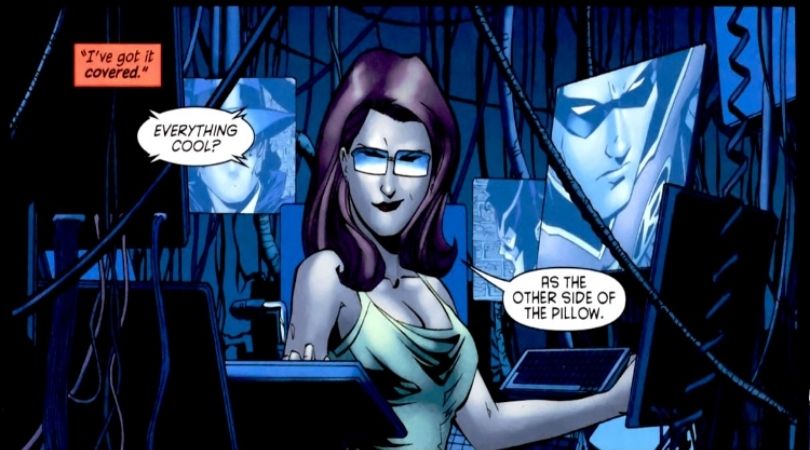
I am aware this take on Barbara Gordon is probably about five years too late. However, I didn’t get to decide when my white blood cells would start attacking my thyroid so blame them.
In comics, it’s rare for characters to stay dead. Yet, for people with lifelong chronic illnesses and disabilities like me, it was disheartening to see Barbara Gordon regain her ability to walk. Yes, disheartening.
When DC first announced the New 52’s release and that Barbara Gordon was going to be swinging around Gotham again as Batgirl, I was excited. I was also an incredibly healthy woman and didn’t understand the immense impact Oracle has on disabled people. Don’t get me wrong: I love Babs as Batgirl but to me, she will always be more powerful as Oracle.
I have not always been chronically ill. I was recently diagnosed with vestibular migraines, a nervous system problem that causes repeated dizziness (or vertigo-type symptoms) in people who have a history of migraines. Due to this issue, I have been forced to use a wheelchair off and on. In addition, I have suffered from Hashimoto’s Disease, Fibromyalgia, Chronic Fatigue, IBS, and Hypertension for about two years now. My health journey has been varying walks through mental and physical hell.
I have always loved Batman. I remember watching Batman: The Animated Series and Batman Beyond as a kid, but I didn’t start reading comics until I saw The Dark Knight in theaters. I was familiar with Barbara Gordon and her role as Batgirl and then as Oracle, but it wasn’t until I was diagnosed with Hashimoto’s Thyroiditis and Fibromyalgia did her role really begin to mean something to me.
A lot of healthy people don’t realize how difficult medical leave is. It’s not a vacation. It’s draining and heartbreaking. I wanted nothing more than to be healthy enough to go to work. I felt lost in my own brain and often physically ill, in addition to my deteriorating mental condition. I turned to video games and comics to keep sane.
This was around the time Arkham Knight released on PS4. This game will always hold a special place in my heart because it dug me out of a pit. I saw Oracle as a reflection of myself guiding Batman through various Riddler puzzles and defeating goons all while keeping my anxiety at bay. Seeing Oracle in her various iterations made me realize my life had changed in a drastic and terrifying way but I did not have to stop fighting for anything I believed in.

Following the events of The Killing Joke, Barbara Gordon was paralyzed by a gunshot wound from the Joker. Instead of wallowing in self-pity like I want to do most days of the week, Babs picked herself up and changed the world. She used her photographic memory and heightened hacking and computer skills to create one of the most dangerous online personas in the world. She began to aid Batman and The Justice League, as well as run The Birds of Prey. Barbara Gordon did more for Gotham and the world from her wheelchair than Bruce Wayne ever did from his Batcave.
Prior to being ill I was naïve. I didn’t realize what Barbara as Oracle meant to people because I didn’t know yet what she meant to me. I loved Gail Simone and artist Ardian Syaf’s run on New 52 Batgirl as well as the following run from Cameron Stewart, Brenden Fletcher, and Babs Tarr. Normally, though, disabled individuals do not get a reboot on their health. I don’t get to walk away from my issues like Barbara. I have to wake up and continue to face them and their physical and mental consequences. I do appreciate that Simone focused heavily on the PTSD of the Joker’s attacks and worked to find as “realistic” a treatment as possible for Barbara to undergo.
Overall, I understand that the comics industry is constantly changing. For example, Barbara Gordon has had multiple origin stories since her introduction into comics, and there have been multiple ladies to take the mantle of Batgirl. However, as a disabled person, I’m hurt to see the little visibility and representation we have taken away. I think a more powerful approach to getting Barbara back into the suit would have been a longer lead-up with Barbara doing real-life and some ‘comic book’ treatments to getting her legs back.
A story of Barbara simultaneously being Oracle at night while pushing herself in physical therapy without the rest of the Bat-Family or Birds of Prey knowing would have spoken to a lot of disabled people’s insecurities. Walking after a spinal cord injury is a possible but incredibly taxing process. I would have loved to see Barbara’s mental and physical anguish trying to walk again and eventually retaking her mantle. This would have been a more powerful way to change the continuity without completely diminishing the representation of disabled individuals.
Originally published for Do You Even Comic Book






